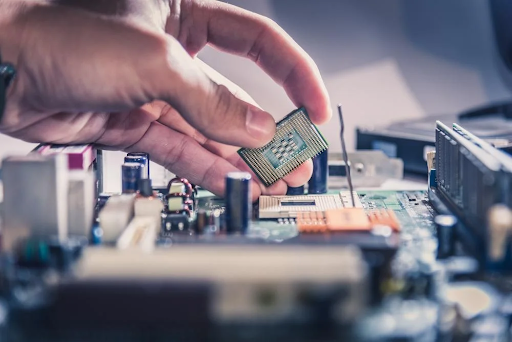In today’s digital age, computers have become the backbone of almost every aspect of our lives, from communication and entertainment to education and business operations. The seamless functionality and incredible processing power of modern computers are owed, in large part, to the tiny yet mighty components known as Integrated Circuits (IC). These microchips, often no larger than a fingernail, are the unsung heroes driving the innovation and efficiency of today’s computing devices. This article will delve into the history, functionality, and profound significance of IC chips in the computer field, exploring how they have revolutionized technology and continue to shape the future of computing.
Brief History of IC Chips
In the early days of computing, devices relied heavily on vacuum tubes and transistors, which were bulky, power-hungry, and prone to frequent failures. As computers became more essential, the need for more efficient and reliable components grew. The breakthrough came in 1958 when Jack Kilby of Texas Instruments and Robert Noyce of Fairchild Semiconductor independently developed the first Integrated Circuits (ICs). These early ICs combined multiple transistors onto a single silicon chip, revolutionizing the computing world by dramatically reducing electronic devices’ size, cost, and power consumption. This innovation paved the way for the development of modern computers, making them faster, more affordable, and accessible to the masses.
What Are IC Chips?
Integrated Circuits (ICs), often called microchips or chips, are the fundamental building blocks of modern electronic devices. An IC chip is a small, flat piece of silicon that contains an intricate network of electronic components, such as transistors, capacitors, resistors, and diodes. These components are interconnected through tiny wires etched into the silicon, allowing the IC to perform complex functions within a minuscule space.
There are several types of IC chips, each serving specific purposes. Analog ICs process continuous signals and are commonly used in amplifiers and sensors. Digital ICs handle discrete signals, making them essential in processors and memory devices. Mixed-signal ICs combine analog and digital functions, which are crucial for applications like digital signal processing.
IC chips function by routing electrical signals through their network of components, enabling them to perform tasks such as processing data, storing information, and controlling electronic devices. Integrating millions or even billions of components onto a single chip has been the key to advancing computer technology, making devices more powerful, efficient, and compact.
Role of IC Chips in Modern Computers
Integrated Circuits (ICs) are the lifeblood of modern computers, playing a central role in various critical components. At the heart of every computer lies the Central Processing Unit (CPU), often referred to as the “brain” of the computer. The CPU comprises billions of tiny transistors packed into IC chips, which perform the essential tasks of processing instructions, executing commands, and managing data flow. The efficiency and speed of a CPU, and by extension, the computer, are directly linked to the advancements in IC technology.
Beyond the CPU, IC chips are integral to memory and storage devices. In Random Access Memory (RAM), IC chips temporarily store data the CPU needs to access quickly, facilitating smooth and efficient multitasking. Similarly, in Read-Only Memory (ROM) and flash storage, IC chips store essential data permanently or semi-permanently, ensuring the computer can retrieve critical information even after power is turned off.
IC chips also control and manage peripheral devices such as keyboards, mice, and printers, ensuring seamless communication between the computer and its external components. Additionally, they play a vital role in power management, regulating the distribution and consumption of electricity within the computer. By managing power efficiently, IC chips help extend battery life in portable devices and maintain overall system stability.
Impact on the Computer Industry
The advent of Integrated Circuits (ICs) has had a transformative impact on the computer industry, particularly regarding miniaturization and portability. ICs have created smaller, lighter, and more portable computing devices by allowing more components to be packed onto a single chip. Laptops, tablets, and smartphones owe their compact designs to the continuous advancements in IC technology, making powerful computing capabilities available on the go.
Mass production of IC chips has also driven down the cost of computing devices, democratizing access to technology. As the price of components decreased, more people worldwide could afford computers, fueling the digital revolution and expanding the reach of technology in everyday life.
Moreover, the relentless improvement of IC chips has led to significant advancements in processing power, speed, and overall computer performance. Each new generation of ICs brings faster processors, larger memory capacities, and more efficient energy use, pushing the boundaries of what computers can achieve. This progress has not only enhanced the user experience. Still, it has also opened the door to new applications and innovations in fields such as artificial intelligence, data analytics, and virtual reality.
Challenges and Future Trends
Despite their remarkable advancements, Integrated Circuits (ICs) face ongoing development challenges. Heat dissipation remains a significant issue as more transistors are packed into more minor chips, leading to increased power consumption and thermal management concerns. Additionally, the limits of miniaturization are being tested, as shrinking components further could compromise performance and reliability.
Looking to the future, innovations such as quantum computing and 3D ICs promise to push beyond these boundaries. Quantum computing could revolutionize processing power by leveraging quantum bits, while 3D ICs, which stack multiple layers of circuits, offer potential solutions for enhancing performance without further shrinking components. The ongoing trend toward greater integration and the development of new materials and technologies will likely shape the evolution of IC chips, driving the next wave of computing breakthroughs.
Conclusion
Integrated Circuits (ICs) have been pivotal in shaping the modern computing landscape, driving extraordinary advancements in processing power, memory, and portability. These essential components form the backbone of virtually all electronic devices, revolutionizing how we live and work. As IC technology continues to evolve, overcoming current challenges and embracing new possibilities, these diminutive chips will undoubtedly remain central to the future of computing.
At RANTLE, with over 20 years of experience in the electronic components market, we understand the dynamic nature of the global electronics supply chain. As opportunities and challenges arise, we stand ready as your independent distributor to help you navigate this ever-changing landscape and source the exact electronic components you need.











